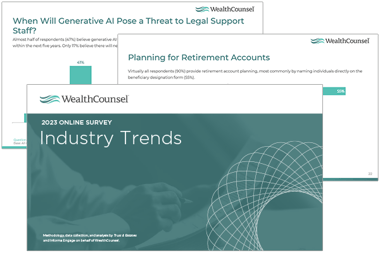
More industries are increasingly using artificial intelligence (AI), and the legal field is no exception. News breaks regularly about new tools that utilize and incorporate AI technology. The outer limits of a machine’s ability to think and act on its own are unknown—AI creators have even expressed fears of its ultimate capabilities.
The drawbacks of generative AI chatbots such as ChatGPT, Google Bard, and Jasper for the legal industry in particular include their inability to consider all necessary information when crafting legal documents and their collection and storage of private data, which could breach client confidentiality. As we recently showed in a case study, AI solutions are also significantly limited in their abilities to accurately draft estate planning documents.
Despite these drawbacks, AI tools may offer some solutions to help legal professionals streamline their processes. Keep reading to learn how AI can help improve your productivity.
When To Use AI
AI tools that improve business efficiency are rapidly entering the market. The legal field is one of many industries exploring whether and how to incorporate AI solutions into its operations. While there is good reason to proceed with caution, the completion of certain tasks can be facilitated by using AI.
If you often meet with clients and colleagues via Zoom, AI transcription tools may be worth trying. Instead of jotting down notes while you are trying to talk and listen, you can focus on what people are saying while the AI program transcribes the session. You can also highlight parts of the transcribed meeting and then organize the highlighted parts into categories or share with others. One concern to be aware of with AI transcription programs, however, is that they can inaccurately infer emotions in speakers’ words.
Perhaps the best use of artificial intelligence in the legal sphere is the drafting of client-facing letters and emails using natural language programs such as AI chatbots. You can experiment with different styles and tones by entering commands directing that the content be created for a specific audience, and you can modify the results to your liking.
AI can also be used to handle tasks that are too complex, inconvenient, or mundane for your firm. AI chatbot functionality built into your website can answer common questions automatically without tying you up on the phone. AI can also help you brainstorm creative ideas. This may sound like something a computer should not be able to do, but remember: generative AI tools have been trained by the collective works of countless humans. Try asking an AI chatbot for ideas for promotions, marketing campaigns, or blog topics, and keep in mind that while all of the results may not work, you could end up with a winner.
When Not To Use AI
Do not use AI to produce legal or technical written content, especially if that content cannot or will not be fact-checked by a human. The material you receive from AI tools could be incorrect, inappropriate, or violate intellectual property rights. AI tools can be helpful, but you should not lean on them too heavily for technical content at this early stage of the technology’s development.
Case in point: one unwise lawyer got into trouble when he cited cases that he researched using ChatGPT. Unfortunately, the cases did not exist. This AI “hallucination” is just one example of the ways the siren song of AI can lure you into perilous waters. Any material that you receive from an AI assistant or chatbot must be examined very closely. AI is as fallible as the humans who write its source content; it is incapable of verifying the accuracy of the material it generates, and it does not always provide explanations and sources for its results.
In addition, you must never enter private client information into AI chatbots. Doing so could violate an attorney’s duty to keep client information confidential. Data can be collected, stored, and used in many ways, including to train the software, so there is the risk that it could be leaked. AI solutions should also not be used for any endeavors that require creativity or call for human influence and emotional connections with clients.
Considering these risks, it can be disquieting when the loudest warning voices come from the technology’s own creators. Geoffrey Hinton, known as “The Godfather of AI,” walked away from his job at Google in 2023 to talk about these risks, stating that “these things could get more intelligent than us and try to take over.”
AI in the Legal Field
Currently, most attorneys and their staff do not use generative AI, but according to the 2023 Estate Planning Industry Trends Survey, 54 percent of them said they are not opposed to the practice. However, almost half of the survey respondents believe that AI will threaten the jobs of paralegals and support staff over the next five years. Computers with immense brainpower can identify patterns and make insights better than humans, and they can do it quickly. They can also analyze a law firm’s business operations and streamline them for maximum efficiency.
Download the full 2023 Industry Trends Survey for free to see the latest opportunities and challenges for estate planning professionals.
AI Versus Content Marketing Services
While you will see many more AI options in the coming years, traditional content marketing services remain valuable. While AI chatbots can be quick and efficient at generating content, they still require oversight and research to ensure that the marketing materials being generated are legally accurate, up-to-date, and do not mislead consumers.
Alternatively, Marketing Source from WealthCounsel includes content created by attorneys for attorneys. This means you can spend less time researching and reviewing the finished product. The content will be timely, relevant, and accurate, with a human element from attorneys with decades of experience in estate planning, business law, and elder law. To learn more about how Marketing Source can improve your practice, click here.




.png)